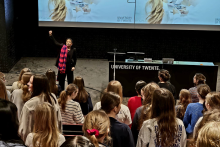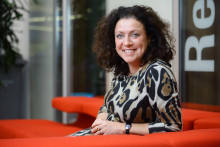‘The feeling of being a minority is still the same’
Professor Suzanne Hulscher

‘When I started at the UT, there were only 3% of female professors at the whole university. When I had my inaugural lecture in 2003, there were fifty professors present and only one of them was a woman. Yet, now, there is still a problem. Women are still a minority. It is not as bad as it used to be, but the feeling of being a minority is still the same for young women.
The situation was definitely worse when I started. I came to the UT in 1996 as a postdoc in the civil engineering department. At the time, it was still the old men with cigars who held the key. The numbers of women in academia were really low. When I became a professor, one older male colleague even looked at me and commented ‘I see it is becoming much easier to become a professor’. I became the first female professor in my department, the faculty and the first female professor in civil engineering in the country. Plus the youngest, I was only 35 years old – so I was an exception in several ways.
‘I got underestimated very often’
I’ve had many struggles throughout my career. I have all the classical examples. Like when I went to a board meeting, I was waiting there, another professor came in and said ‘oh there is still nobody here’. He thought I was there to just pour coffee. At another point, somebody asked me: do you know when professor Hulscher will come? I got underestimated very often, but the quality of my research was never questioned. Also thanks to the fact that I got some large grants, including a Vici. Such grants give you a certain status in the scientific world. What helped me further was that there were key males in my environment who really motivated me and helped me get contacts in certain networks. Also, before I applied for the full professorship, I was ad interim head of the group. That really helped, it gave me a chance to show I was a leader. Otherwise I think it would be hard for the committee to consider me.
I led the Ambassador’s Network for ten years and I really tried to promote women in science. I wanted more female colleagues. I did my best and the number of women grew. We established specific tenure positions for women, we gave out small grants just for female scientists. We had discussions with deans – which was amusing at times. They weren’t always happy to talk to us, they didn’t want to face the problem. The perception was that women always take leaves, they are always on parental leave and they don’t want to work full time. At the same time, that was the cultural expectation – women were expected to do that. I think that culture is changing now. But back in the day, one professor even directly told me: I will never hire a woman between 30 and 40 years old. It is different now. I think internationalization also helped, because these expectations are not the same in all cultures.
‘It’s not the women who miss a chance, it is academia’
I’ve lobbied for more female colleagues, because it is better for science. If we don’t have women, a lot of talent doesn’t get a chance in academia. We know of the issue of the leaking pipeline, and so not the best get to the top. Many disappear along the way. It’s not the women who miss a chance, it is academia: academia misses great opportunities for reasons that have nothing to do with the quality of the women.

What we could do? We should be transparent about requirements, about what you need to do to reach higher positions. And women themselves should show their qualities. But that is not common in all cultures, especially not for women. I try to stimulate women in my group to showcase their results and qualities. Women are less seen than men. For some positions, men are a lot more invited than women. Good women get overlooked. Selection committees have a crucial role in this. They should represent the culture you want to have – to also give the applicants the idea that they are welcome here.
‘We could be the foster university for all female scientists’
My advice to women would be: show yourself and be explicit in your wishes. To the university I would say: show women this is an attractive university for them. We are a small university, and so we can change faster. We could be the foster university for all female scientists. But don’t just try to get women in, make sure they stay. We see them leaving and we need to learn why. Create a way to show their wishes if they are not heard in their faculty. As a young academic, you have a lot of tasks and you are constantly competing with others, so you might need additional help and coaching. We should show we are proud of the women we have, give them visibility and publicity.’
‘Being ambitious in academia can be more
challenging for women’
Professor Marieke Huisman

‘I think women are still underrepresented, but the situation is improving. I see there is a growing awareness that being ambitious in academia can be more challenging for women. When I look at my male colleagues, I see their partners generally don’t work full time and are able to run things at home while they travel a lot. However, if I look at female colleagues I see their partners also work full time. There is generally more juggling for women. But there is a growing awareness of this.
I didn’t enter academia because I wanted to have a big career. I thought research was really interesting. I do remember one of my first days as a PhD, it seemed like all other women in the department were secretaries. However, I can handle being a minority. I was already a minority as a student of computer science. I’ve never had a problem with that. I try to stay true to myself and what I find important. I must say that working in science has been quite smooth for me. I got lucky in a way, especially when I started at the UT. I got my ERC grant and Vici grant. With all these big grants there was never any doubt about me.
‘There is a growing willingness to improve the situation for women’
I see there is a growing willingness to improve the situation for women. I can tell deans see the importance of it and would like to change it. But it can be tricky. Once you start talking about measures designed for women, such as the Hypatia chairs, some people see it as positive discrimination and don’t want to use it. I think these measures are good, because you need to catch up.
I just think it’s important to talk about this. When I started to study, there were only eight girls. You realize you are a minority. And I think computer science is wonderful. It is such a pity that most women don’t even consider it as a career option. Now, still you see you are a minority. When I’m at meetings with leadership, I’m usually the only woman in the room unless someone from HR decides to join. So I see there are still changes needed. That drives me. You need to speak up, ask why women aren’t represented.
‘There are still changes needed’
We should definitely actively scout for female candidates, that is necessary. I’ve always tried to at least hire women myself. I never compromise on quality, but I always carefully consider female candidates. But it’s not only about getting the women in, it’s also about creating an inclusive environment. We also need to transparently discuss what is needed to make the next career step, show them it’s a possibility and under what conditions. It’s about talent management.

To women interested in career in academia I’d say: It is worth doing. I never pour coffee for anyone. I try not to be seen as the assistant. If you are the only woman in the room, it can be easy for them to put you in that position. You need to show a bit of leadership, show what you find important and speak up if you disagree. Yes, there are some annoying bits to the job but I like being in the position I’m in. I work with many young people and I can coach them, help them get where they want to go. I find that very satisfying. I had a great boss who really helped me to get where I wanted to go and also to say no sometimes. It is very important to have coaching.
‘Bringing your child to daycare and working does not mean that you are a bad mother’
You need to be good, but you also need good environment – and a bit of luck. I had a partner who helped a lot at home. That is something that shouldn’t be underestimated. I’ve also been lucky with my children. I know if something was going wrong at home, I would have to slow down my career because in the end they are more important. I was also lucky to live in France when I had my first child. There everyone expected me to keep on working. In the Netherlands, it can be tough. There are social norms and people don’t think it’s great for children to be in daycare too much, so you are expected to work less. That is something I share with women: bringing your child to daycare and working does not mean that you are a bad mother.’
‘Once I joined committees, I started seeing
something was not right’
Professor Tanya Bondarouk

‘There is a difference between how I see the issue of women in science and how I experience it. Especially given my background in HRM and research I’ve done, I know that, policy-wise, the situation could and should be improved. On the other hand, I didn’t experience any difficulties related to gender in my own career. I’m fully dedicated to standing up for women in science, but I never experienced any obstacles. When I talk of difficulties for women, I’m always talking about someone else, not myself. After all, I’m still smiling and still happy in my job.
‘I didn’t experience any difficulties related to gender in my own career’
I came to the UT in 1998 as a Master’s student, I did my PhD here and then I stayed. I had other job possibilities, but I always decided to stay in Twente. I have worked with seven deans in my school, I have experienced six mergers, dealt with six research accreditations. I became a full professor within ten years, which is relatively fast. I always wanted to develop further and kept going. Not everything went smoothly but not because of my gender. What helped me along is my entrepreneurial spirit, certain persistence in my genes. I also always had good colleagues, good people around me who helped me along and who I’m very grateful for.
I’m now chairing the UT committee on recognition and rewards and the SEG ‘Individuals and Teams’ with Jennifer Herek, the dean of the ST Faculty. Suzanne Wichman, secretary of the UT, is also in this committee. Both women are at high positions. This is something I’m very happy to see and something that would not have been real ten or fifteen years ago. Even this talk would not have been possible fifteen years ago. It would not really be taken seriously. Yes, we were able to discuss careers of women but that wouldn’t help much. In the past, I cannot recall many female representatives in UT boards and big committees. Yes, there were women here but the representation in committees and boards was not equal. Now there are many bottom-up movements. People feel they can speak up and that their opinions matter.
‘This talk would not have been possible fifteen years ago’
In the beginning of my career, I wasn’t concerned with the low female representation at all. But once I joined different committees, I started seeing something was not right. During meetings I felt that sometimes a female colleague wanted to share her opinion and nobody would hear it. Then a male colleague takes the floor and says the same idea, and gets the full attention. You need to learn to navigate it. I never wanted to lose myself, though. I wanted to keep my attitude, my emotions, my body language, - who I was. I did not need to “become” a man during such meetings. But it helps to find some tricks. For example, body language makes a big difference, trust in yourself while addressing the audience. You can learn to trust yourself more, not be afraid to enter a debate, trust your expertise and don’t let bad remarks go by. There are still residues of antique culture when women are not heard enough. But it is also up to us, as women, to bite back and speak up.
We need to have discussions about this issue, invite people from top management and let them hear stories. They will be surprised, I can promise that. I know some things are not alright yet. Based on my small research project, I know some UT Master’s students who don’t feel comfortable to be a girl here. For example, a teacher enters a lab and directly approaches female students with the question if they need help with the equipment. This is not meant badly, the intention is good, but it can be perceived very differently. Of course, there is certain bias in this research project but in the end, every single case counts, it’s about individuals. Stuff like that should not happen to a single girl here.
‘Trust your own strength’
Have conversations, have ethical discussions. Think of MindLab, that worked really well. I see that open discussions touch people, make them aware. If it comes to individual women, I’d say: trust your own strength and find people who give you energy. The world isn’t limited to your department, look for the right match.’









